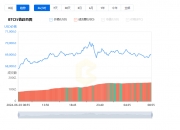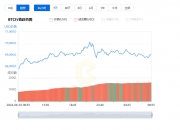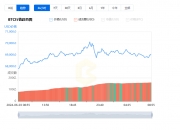价值投资VS投机赚钱,从李笑来录音看价值投资为何在中国难盛行 ?
Valuable investment in VS makes a profit by recording it from Li laughter why it's hard to be popular in China?
集“币圈首富”、“前新东方名师”、“投资人”等身份于一身的李笑来,在币圈里本就是一个宗师级人物,这几天着实又火了一把。原因是一段关于“币圈首富”李笑来“割韭菜”的录音曝光。这段长达53分钟的对话涉及李笑来对多个币圈大佬的评价,更重要的是其炒币心得曝光,这在币圈引发了动荡。
The laughter of Li, in his capacity as “the rich in the currency ring”, “the famous ex-Orientian”, “the investor” and so on, was a very big-time character in the currency business, and in those days, it became a real thing. The reason for this 53-minute conversation was the exposure of a recording of “the rich in the currency” and “the cut of vegetables”. The 53-minute conversation was about Lee laughing at the big guys in the currency ring, and, more importantly, about the exposure of his punctuated currency, which caused instability in the currency ring.
在这段录音中,除了各种“做币要诀”,李笑来还提到了价值投资与投机。他认为,不要盲目的相信“价值投资”,如果你随波逐流地认为价值投资是对的,那你注定是个平庸的人。同时提到,不管投机还是投资,赚到钱的才是成功,你投资也可以失败,你投机也可以成功。
In this recording, in addition to the various “dollars”, Li laughs about value investment and speculation. He argues that do not blindly believe in value investment, and if you think value investment is right, you are destined to be a mediocre person.
这话没错,不只是炒币,炒房、炒股票、投资P2P都是为了赚钱,赚到钱就是成功的。只是,投机赚钱比价值投资要容易的多,而在乌烟瘴气的币圈里,人人都想着割韭菜,空气币到处都是,哪里还有什么价值投资?这种情况下,即便看好某链相信其价值的项目,以价值投资的名义投资某币的行为,估计也早已变成了投机行为。
That's right, not just for currency, house, stock, investment in P2Ps, but for money. It's just that speculation for money is easier than investment in value, and everyone wants to cut vegetables and air coins everywhere.
何况,李笑来的“炒币宝典”所讲的都是如何快速取巧的做币盈利,这是讲给同行做的,皆以投资散户为韭菜,几个月甚至多少天就可以割韭菜,如此短的时间又何谈价值投资?
What is more, Li's laughter about how to make money quickly is about how to make money. It's about how to make money quickly.
很多人都不解,既然投资货币有这么大风险,为什么还要去投资?这还要从大经济形势来说起了。要知道,现在谁都不愿把钱放在银行里,因为基本挣不到钱。而炒房呢,一般的小钱买不了好位置的大房子,各种限购政策又给不动产理财增加了很多不利因素,很多人也就没法在房子上打主意。但都明白抵御膨胀这个道理,加上金融机构有意引导,很多钱都涌向了P2P领域以及创投领域。
A lot of people don't understand why they want to invest, given the risk to the investment currency. This has to be done in the context of the larger economy. You know, no one wants to put the money in the bank now, because they can't make any money.
先说创投领域。2015年开始的创投潮,鼓励“大众创业万众创新”,意在激励民间资本流入创投市场,让这些钱能够帮助创业者实现项目成功,最终双双盈利,这其实就是在引导价值投资。然而,要等待一个创业项目上市或者持续融资以退出盈利,少则三年,多则七、八年乃至更久,哪个投资者愿意等这么长时间?如果项目能良性成长还好,但若项目后面无法继续融资死掉了,投的钱岂不是打了水漂?风险还是不小的。
The start-up wave that began in 2015 to encourage “public entrepreneurship and innovation” is intended to stimulate private capital inflows into the market, so that it can help entrepreneurs to succeed in a project and eventually make a two-to-two profit, which is actually leading to value investment. Yet, waiting for an entrepreneurial project to be marketed or sustainably financed to quit profit, for three years, seven, eight, or more, which investor would like to wait so long? If the project grows well, but if the project fails to continue to finance it, the money will not be lost.
相较而言,在股市不好的情况下,P2P理财就轻松的多,且利率高高在上,今天投钱明天就可以提钱,只要不是太差的P2P一般都能挣到钱。但是,跑路的P2P和旁氏骗局太多,看到动辄上百亿的跑路P2P坑苦了那么多人,有些人就不敢再P2P上打主意了。
By contrast, when the stock market is bad, the P2P is easier to manage, and the interest rate is high, and the P2P will be able to raise the money today, as long as the P2P is not too bad. But the running P2P and the P2P scam are too many, and some people are afraid to make any more decisions about the P2P.
恰好,这个时候更暴利的币圈起来了,人们又开始炒币挣钱。但明知道那么多人被割韭菜,却还要进入,是因为人们相信各种币的价值吗?不是,这是因为大家都相信买币能挣钱,而且买的越早买的越多越挣钱。同时,大家都带着侥幸心理,万一这个币不是空气币不会跑路呢?但事实是,所有为了币而发币的项目都是空气项目,你买币是为了挣钱,他们发币也是为了挣钱。区别在于,你是想通过虚拟币买卖挣钱,而发币的人是通过割你们这些韭菜挣钱。
At this point, the more lucrative coins are rounded up, and people start to collide. But knowing that so many people have been cut off, do they have to enter because people believe in the value of the various coins? No, because everyone believes that they can make money and buy as much as they can. At the same time, everyone has the chance that they won't run if it's not air currency. But the fact is that all money-for-money projects are air projects, and you buy it for money, and they do it for money. The difference is that you want to make money by buying and selling virtual currency, and the money-forwarders make money by cutting your pickles.
不管是股票、P2P还是虚拟币,本质上人们都愿意快速挣钱。尤其是在见识了面向各种创业项目的价值投资的高风险与不够高的收益之后,人们更加不相信价值投资的价值。
Both equities, P2Ps, and virtual coins are inherently willing to make quick money. Especially after recognizing the high risks and insufficient returns from value investment in various entrepreneurial projects, people are less convinced of the value of value investment.
而各种生存压力所带来的焦虑,让人们更愿意追逐快钱。然其深层含义则在于,在一些思想的引导之下,人们的投机意识要远重于价值意识。同样是为了挣钱,但投机除了能增加个人财富真的没有太多意义,价值投资则可以充分帮助企业成长并回馈社会。道理大家都懂,但在同样能够拿到10倍回报的情况下,相信大部分人都愿意选择在投机中暴富,更不愿意在长期的焦虑中帮助企业创造社会价值。
And the anxiety of survival pressures increases people’s willingness to pursue fast money. But it means that, guided by ideas, speculation is much more than a sense of value.
这就是的为什么现在大部分人都不相信价值投资的原因了。正是因此,整个社会的资本大都流向金融领域,哪怕他们的钱会在P2P和币圈夭折,而不愿意将钱放到实业这一边,哪怕5-10年之后他们能拿到5-10倍的回报。如果将那些动辄损失达百亿以上的钱用于实业建设,估计中国半导体行业不至于是现在这步田地,或许中国早已有了具备自主知识产权的更高性能的芯片,或许中兴等企业也不会在中美贸易战中受到这么大伤害。
That is why most people now do not believe in value investment. That is why the bulk of the capital of society goes to the financial sector, even if their money dies in P2Ps and coins, rather than putting it on the business side, even five to ten years later.
所以,李笑来的说法没错,不管投机还是价值投资只要能挣钱就是好的。但是,人人都去投机还有谁去做价值投资?只有将价值投资放大,将更多资本引入实体产业,中国实业才能有更好的出路。
So Li is right to say that speculation or value investment is good enough to earn money. But, who else is going to be speculative? Only by scaling up value investment and bringing more capital into the real industry can Chinese business have a better way out.
【王吉伟,商业模式评论人,专栏作者,关注TMT与IOT,专注互联网+及企业转型研究。】
Wang Ji Wei, business model reviewer, columnist, focus on TMT and IOT, focus on Internet+ and business transformation studies.
注册有任何问题请添加 微信:MVIP619 拉你进入群

打开微信扫一扫
添加客服
进入交流群





















发表评论